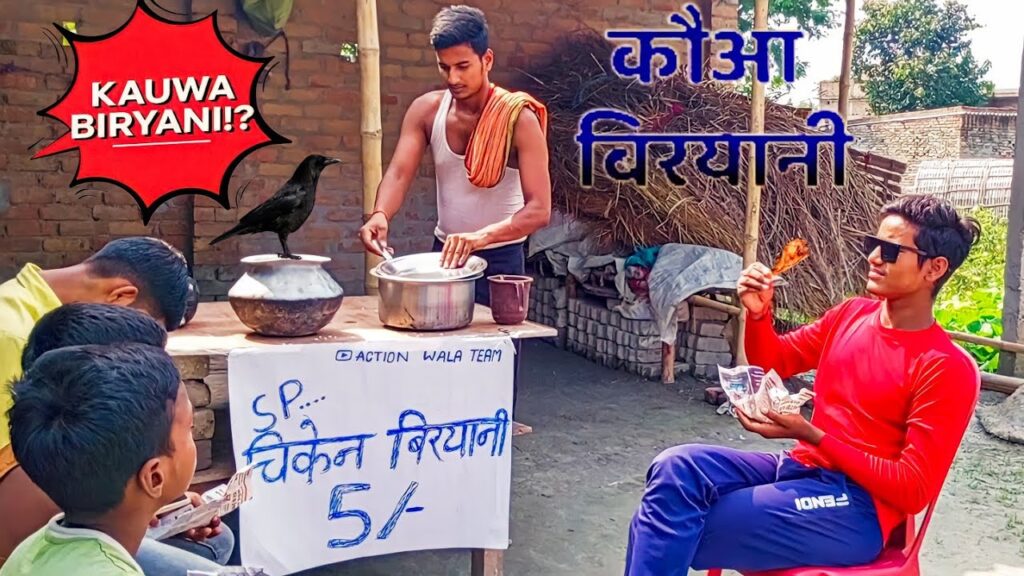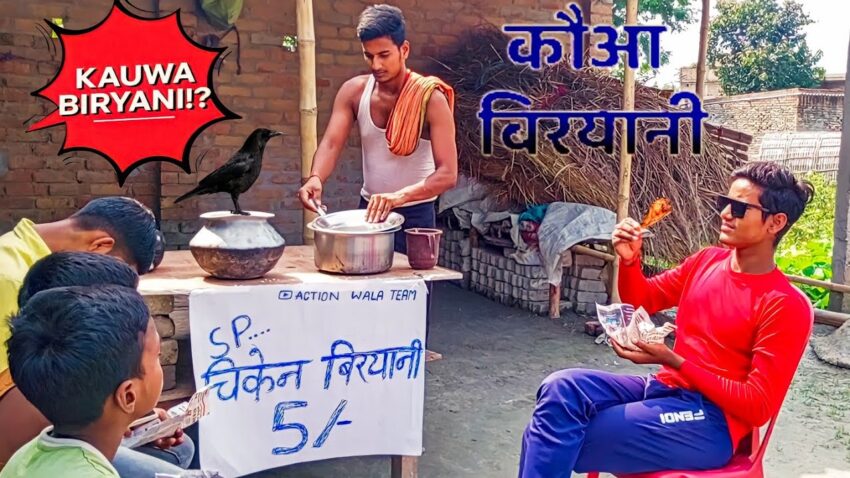
Kauwa Ki Biryani: Separating Fact from Fiction in the Culinary World
The term “kauwa ki biryani” – literally, crow biryani – often surfaces in online discussions, sometimes as a joke, sometimes as a derogatory term for poorly prepared biryani, and sometimes, surprisingly, as a genuine (albeit rare) dish. This article dives deep into the multifaceted nature of “kauwa ki biryani,” exploring its origins, its cultural significance (or lack thereof), and addressing the burning question: Is it real? We aim to provide a comprehensive understanding, separating fact from fiction and offering expert insights into the culinary and cultural landscape surrounding this intriguing phrase. This is not just about understanding the meme; it’s about understanding the broader context of food, culture, and perception. We will explore the term’s usage, its potential origins, and even touch upon the hypothetical (and highly improbable) reality of actually cooking with crow. Through this exploration, we hope to give you a better understanding of food trends and the way people perceive the culinary world.
Understanding the Term: What Does “Kauwa Ki Biryani” Really Mean?
At its core, “kauwa ki biryani” is rarely a literal recipe. It’s primarily used in a few distinct contexts:
- As a derogatory term: This is the most common usage. It’s used to describe a biryani that is perceived as poorly made, using inferior ingredients, or simply tasting bad. Think of it as the biryani equivalent of calling something “garbage.”
- As a meme or joke: The absurdity of the concept – crow, a bird not typically considered food, being used in a complex dish like biryani – lends itself to humor. It’s often used in online forums and social media as a lighthearted jab.
- In rare, specific contexts: Historically, and in certain very isolated regions, there might have been instances where crow meat was consumed out of necessity. However, this is extremely rare and not representative of any mainstream culinary practice. We will explore the historical context, if any, later in this article.
The key takeaway is that “kauwa ki biryani” is almost always figurative. It’s a phrase loaded with negative connotations, implying poor quality and unappetizing food.
The Origins of the Phrase: Tracing the Roots of the Meme
The exact origin of the phrase is difficult to pinpoint. However, its usage likely stems from a combination of factors:
- Crow’s negative perception: Crows are often seen as scavengers and are not typically associated with cleanliness or palatability. This pre-existing negative image makes them an unlikely candidate for a desirable dish.
- Biryani’s status as a delicacy: Biryani is a complex and flavorful dish, often associated with special occasions. The contrast between the perceived sophistication of biryani and the unappetizing image of crow creates a humorous and impactful insult.
- Word-of-mouth and online spread: The phrase likely originated in informal conversations and then spread through online forums, social media, and meme culture.
While the precise genesis remains unclear, the phrase’s effectiveness lies in its ability to instantly convey a sense of disgust and disappointment related to the quality of the biryani in question.
Is Kauwa Ki Biryani Actually Eatable? A Hypothetical Culinary Exploration
Let’s address the elephant in the room: Could you actually make a biryani with crow? While highly improbable and generally unrecommended, let’s explore the hypothetical from a culinary perspective.
Challenges and Considerations:
- Meat Quality: Crow meat is likely to be tough and gamey, requiring extensive preparation to make it palatable.
- Food Safety: Crows are scavengers and can carry diseases, posing potential health risks. Proper handling and thorough cooking would be crucial.
- Ethical Considerations: Hunting and consuming crows may raise ethical concerns, depending on local regulations and personal beliefs.
Hypothetical Preparation:
If one were to attempt to make crow biryani (which we strongly advise against), the following steps might be considered:
- Sourcing: Obtain crow meat from a reputable source (if one exists) or hunt it legally and ethically.
- Preparation: Marinate the crow meat for an extended period in a mixture of yogurt, ginger-garlic paste, and spices to tenderize it and reduce the gamey flavor.
- Cooking: Cook the marinated crow meat slowly and thoroughly, using traditional biryani techniques.
- Flavor Enhancement: Utilize strong spices and aromatic ingredients to mask any undesirable flavors.
Even with these precautions, the resulting dish would likely be far from a culinary masterpiece. The inherent characteristics of crow meat make it an unlikely candidate for a delicious biryani.
The Use of “Kauwa Ki Biryani” in Modern Online Discourse
The phrase “kauwa ki biryani” is frequently encountered in online spaces, particularly in discussions about food, cooking, and restaurants. Its usage is often humorous, but it can also be used to express genuine dissatisfaction. Here’s how it manifests:
- Online Reviews: A negative review might sarcastically state that a biryani tasted like “kauwa ki biryani.”
- Social Media Comments: Users might use the phrase to joke about a friend’s cooking or a disappointing meal.
- Meme Culture: Images or videos depicting poorly made biryani are often accompanied by the caption “kauwa ki biryani.”
The phrase’s prevalence in online discourse highlights its cultural significance as a shorthand for culinary disappointment. It’s a quick and effective way to convey a negative sentiment about the quality of a biryani.
Alternative Phrases for Describing Bad Biryani
While “kauwa ki biryani” is a potent insult, there are other ways to describe a poorly made biryani. Here are a few alternatives:
- “Billi ki biryani” (cat biryani): Similar to “kauwa ki biryani,” this phrase implies that the biryani is made with undesirable ingredients.
- “Kutte ki biryani” (dog biryani): Another variation on the same theme.
- “Plastic biryani”: This describes a biryani that is bland, artificial, and lacking in flavor.
- “Cement biryani”: This refers to a biryani that is dry, hard, and difficult to eat.
- “Overcooked/Undercooked”: Simple and direct descriptions of cooking errors.
The choice of phrase depends on the specific qualities of the bad biryani being described. However, “kauwa ki biryani” remains one of the most memorable and impactful insults.
The Broader Cultural Significance of Food-Related Insults
The use of “kauwa ki biryani” as an insult reflects a broader cultural phenomenon: the use of food-related terms to express negativity or disapproval. This is common across many cultures and languages.
- Comparing something to garbage: This implies that it is worthless and undesirable.
- Calling someone a “rotten apple”: This suggests that they are corrupt or morally flawed.
- Using food metaphors to describe physical appearance: For example, calling someone “pear-shaped.”
These examples demonstrate how food, a fundamental aspect of human life, is often used as a metaphorical tool to express a wide range of emotions and judgments.
Expert Q&A on Kauwa Ki Biryani and Culinary Perceptions
Here are some frequently asked questions about the phrase “kauwa ki biryani” and its broader implications:
-
Q: Is there any evidence that crow meat was ever traditionally used in biryani?
A: No, there is no credible evidence to suggest that crow meat was ever a traditional ingredient in biryani. The phrase is almost exclusively used as a derogatory term.
-
Q: Why is crow specifically used in the phrase “kauwa ki biryani”?
A: Crow’s negative perception as a scavenger and its unappetizing image make it a suitable candidate for a food-related insult.
-
Q: Is it safe to eat crow meat?
A: Eating crow meat carries potential health risks due to the bird’s scavenging habits. Thorough cooking and proper handling are essential, but it’s generally not recommended.
-
Q: Are there any ethical concerns associated with hunting and consuming crows?
A: Ethical concerns may arise depending on local regulations, conservation efforts, and personal beliefs about animal welfare.
-
Q: How does the phrase “kauwa ki biryani” reflect cultural attitudes towards food?
A: It highlights the importance of quality ingredients and proper preparation in culinary traditions. It also demonstrates how food can be used as a tool for social commentary and criticism.
-
Q: What are some other examples of food-related insults?
A: “Billi ki biryani,” “kutte ki biryani,” “plastic biryani,” and “cement biryani” are some examples. More broadly, comparing something to garbage or calling someone a “rotten apple” are common food-related insults.
-
Q: Is the use of “kauwa ki biryani” offensive?
A: While not inherently offensive, its use can be considered impolite or disrespectful, particularly when directed at someone’s cooking or a restaurant’s food.
-
Q: How has the internet influenced the spread and usage of the phrase “kauwa ki biryani”?
A: The internet has facilitated the rapid spread of the phrase through online forums, social media, and meme culture. It has also contributed to its evolution and adaptation.
-
Q: Are there any regional variations in the meaning or usage of “kauwa ki biryani”?
A: While the core meaning remains consistent, regional variations in culinary preferences and cultural nuances may influence the way the phrase is interpreted and used.
-
Q: What does the future hold for the phrase “kauwa ki biryani”?
A: As long as there are poorly made biryanis and online forums to discuss them, the phrase “kauwa ki biryani” is likely to persist as a colorful and impactful insult.
Conclusion: The Enduring Legacy of a Culinary Insult
In conclusion, “kauwa ki biryani” is far more than just a funny phrase. It’s a cultural artifact that reflects our attitudes towards food, quality, and culinary disappointment. While the idea of actually eating crow biryani is unappetizing (and potentially unsafe), the phrase itself serves as a potent reminder of the importance of good ingredients, skillful preparation, and the power of language to express our culinary experiences. So, the next time you hear someone say “kauwa ki biryani,” you’ll know that they’re not just talking about a bad meal; they’re invoking a rich and complex cultural history.
Share your experiences with disappointing biryani in the comments below! Have you ever encountered a biryani so bad it deserved to be called “kauwa ki biryani”? Let us know your stories!

